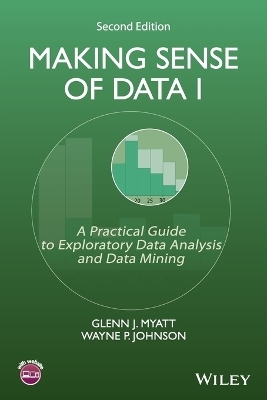
Making Sense of Data I
John Wiley & Sons Inc (Verlag)
978-1-118-40741-7 (ISBN)
Praise for the First Edition
“...a well-written book on data analysis and data mining that provides an excellent foundation...”
—CHOICE
“This is a must-read book for learning practical statistics and data analysis...”
—Computing Reviews.com
A proven go-to guide for data analysis, Making Sense of Data I: A Practical Guide to Exploratory Data Analysis and Data Mining, Second Edition focuses on basic data analysis approaches that are necessary to make timely and accurate decisions in a diverse range of projects. Based on the authors’ practical experience in implementing data analysis and data mining, the new edition provides clear explanations that guide readers from almost every field of study.
In order to facilitate the needed steps when handling a data analysis or data mining project, a step-by-step approach aids professionals in carefully analyzing data and implementing results, leading to the development of smarter business decisions. The tools to summarize and interpret data in order to master data analysis are integrated throughout, and the Second Edition also features:
Updated exercises for both manual and computer-aided implementation with accompanying worked examples
New appendices with coverage on the freely available Traceis™ software, including tutorials using data from a variety of disciplines such as the social sciences, engineering, and finance
New topical coverage on multiple linear regression and logistic regression to provide a range of widely used and transparent approaches
Additional real-world examples of data preparation to establish a practical background for making decisions from data
Making Sense of Data I: A Practical Guide to Exploratory Data Analysis and Data Mining, Second Edition is an excellent reference for researchers and professionals who need to achieve effective decision making from data. The Second Edition is also an ideal textbook for undergraduate and graduate-level courses in data analysis and data mining and is appropriate for cross-disciplinary courses found within computer science and engineering departments.
Glenn J. Myatt, PhD, is Chief Scientific Officer and Cofounder of Leadscope, Inc. The author of numerous journal articles, Dr. Myatt, is also the coauthor of Making Sense of Data II: A Practical Guide to Data Visualization, Advanced Data Mining Methods, and Applications and Making Sense of Data III: A Practical Guide to Designing Interactive Data Visualizations, both of which are published by Wiley. Wayne P. Johnson, MSc, is Cofounder of Leadscope, Inc., as well as a partner of Myatt & Johnson, Inc. He has over 35 years of experience in software engineering related to operating systems, telecommunications, and artificial intelligence at various companies including IBM, AT&T Bell Laboratories, and Ford Motor Company. He has led research projects related to informatics, and in addition to authoring numerous journal articles, Mr. Johnson is the coauthor of Making Sense of Data II: A Practical Guide to Data Visualization, Advanced Data Mining Methods, and Applications and Making Sense of Data III: A Practical Guide to Designing Interactive Data Visualizations, both of which are published by Wiley.
Preface ix
1 Introduction 1
1.1 Overview 1
1.2 Sources of Data 2
1.3 Process for Making Sense of Data 3
1.4 Overview of Book 13
1.5 Summary 16
Further Reading 16
2 Describing Data 17
2.1 Overview 17
2.2 Observations and Variables 18
2.3 Types of Variables 20
2.4 Central Tendency 22
2.5 Distribution of the Data 24
2.6 Confidence Intervals 36
2.7 Hypothesis Tests 40
Exercises 42
Further Reading 45
3 Preparing Data Tables 47
3.1 Overview 47
3.2 Cleaning the Data 48
3.3 Removing Observations and Variables 49
3.4 Generating Consistent Scales Across Variables 49
3.5 New Frequency Distribution 51
3.6 Converting Text to Numbers 52
3.7 Converting Continuous Data to Categories 53
3.8 Combining Variables 54
3.9 Generating Groups 54
3.10 Preparing Unstructured Data 55
Exercises 57
Further Reading 57
4 Understanding Relationships 59
4.1 Overview 59
4.2 Visualizing Relationships Between Variables 60
4.3 Calculating Metrics About Relationships 69
Exercises 81
Further Reading 82
5 Identifying and Understanding Groups 83
5.1 Overview 83
5.2 Clustering 88
5.3 Association Rules 111
5.4 Learning Decision Trees from Data 122
Exercises 137
Further Reading 140
6 Building Models From Data 141
6.1 Overview 141
6.2 Linear Regression 149
6.3 Logistic Regression 161
6.4 k-Nearest Neighbors 167
6.5 Classification and Regression Trees 172
6.6 Other Approaches 178
Exercises 179
Further Reading 182
Appendix A Answers to Exercises 185
Appendix B Hands-on Tutorials 191
B. 1 Tutorial Overview 191
B. 2 Access and Installation 191
B. 3 Software Overview 192
B. 4 Reading in Data 193
B. 5 Preparation Tools 195
B. 6 Tables and Graph Tools 199
B. 7 Statistics Tools 202
B. 8 Grouping Tools 204
B. 9 Models Tools 207
B. 10 Apply Model 211
B. 11 Exercises 211
Bibliography 227
Index 231
| Erscheint lt. Verlag | 11.8.2014 |
|---|---|
| Verlagsort | New York |
| Sprache | englisch |
| Maße | 152 x 229 mm |
| Gewicht | 345 g |
| Themenwelt | Informatik ► Datenbanken ► Data Warehouse / Data Mining |
| Mathematik / Informatik ► Informatik ► Theorie / Studium | |
| Informatik ► Weitere Themen ► Hardware | |
| Mathematik / Informatik ► Mathematik | |
| ISBN-10 | 1-118-40741-5 / 1118407415 |
| ISBN-13 | 978-1-118-40741-7 / 9781118407417 |
| Zustand | Neuware |
| Haben Sie eine Frage zum Produkt? |
aus dem Bereich


